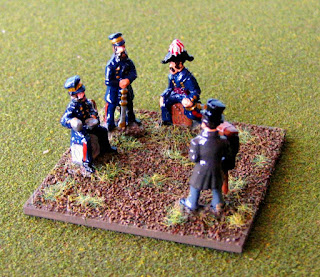From the
Sapoune Heights Lord Raglan watches the Light Brigade regiments withdrawing
back to their start positions, satisfied that they have driven off the enemy
cavalry, albeit with serious losses. Below
him to his right the 1st Division is positioned at the mouth of the South
Valley and the 4th Division is almost deployed on their left. In
addition a French infantry division is establishing itself opposite the North
Valley. Raglan knows that to secure Balaclava and resume the siege of
Sebastopol he will need to regain control of the Causeway Heights and recapture
the redoubts, whose guns have been taken by the Russians. He is troubled by the
torrent of strong messages coming from the Sebastopol siege lines that
suggested that the siege was threatened by the removal of so many troops. Over
his shoulder the sun is sinking below the hills in the late October sky.
As for the
Russians, Liprandi, gazing across the valley towards Raglan, weighs up the
situation. He is convinced that the
British will attack the heights and, with the Battle of the Alma fresh in his
mind he knows that he could not defeat an assault by three allied Divisions.
There is no sign of movement as yet, so he decides to consolidate his defensive
posture on the Causeway heights and await Raglan’s next move:
Raglan
calls in the Division Commanders as well as the French leaders for a council of
war. He issues orders for an attack at first light on 26 October. 1st
Division is to drive up the South Valley and retake the eastern end of the
Causeway heights, including Canrobert’s Hill (off the board). 4th
Division is to storm the heights and recapture No 5, 4 and 3 Redoubts; while
the French are to sweep around the North, secure the Fedioukine Hills and the
North valley.
26 October:
The allied
staffs, including Lord Raglan, arrive at HQ on the Sapoune Heights. Below the
British and French infantry are preparing to move. A messenger from Lucan
arrives advising Raglan that light cavalry scouts report that the Russians have gone. During the night they have
withdrawn back to their positions occupied before the battle. The allied
assault is cancelled and the battle is over.
Balaclava
Analysis:
Who won?
Based upon the game objectives it is clear that this is an outright win for the
Russians. To win they had to be in control of the Causeway Heights at the end
of the battle. That was achieved. The Russian strategic objective was to
undermine the siege operations against Sebastopol and that too was achieved by
threatening the main allied supply base at Balaclava harbour and by drawing large numbers of troops away
from the Sebastopol siege lines. That said, the effect was short lived as the Russians
withdrew during the night, allowing the allied forces to return to the siege.
Overall I consider this to have been a total victory for the Russians.
Observations:
Introducing
the variables of characters and reactions to orders added enormous fun to the
battle. It also meant that the outcomes of actions could not be easily
predicted and brought in an element of realism, especially for the allies,
which suffered from the clash of personalities, confused command and delays.
The rules:
Once again
I used my own rules and mostly they worked well; however, I had to modify the
melee rules somewhat to take into account fresh troops being committed to an ongoing melee, flank
attacks and multiple unit action.
Overall this was the
most ambitious Crimean action so far – but very enjoyable.





















































